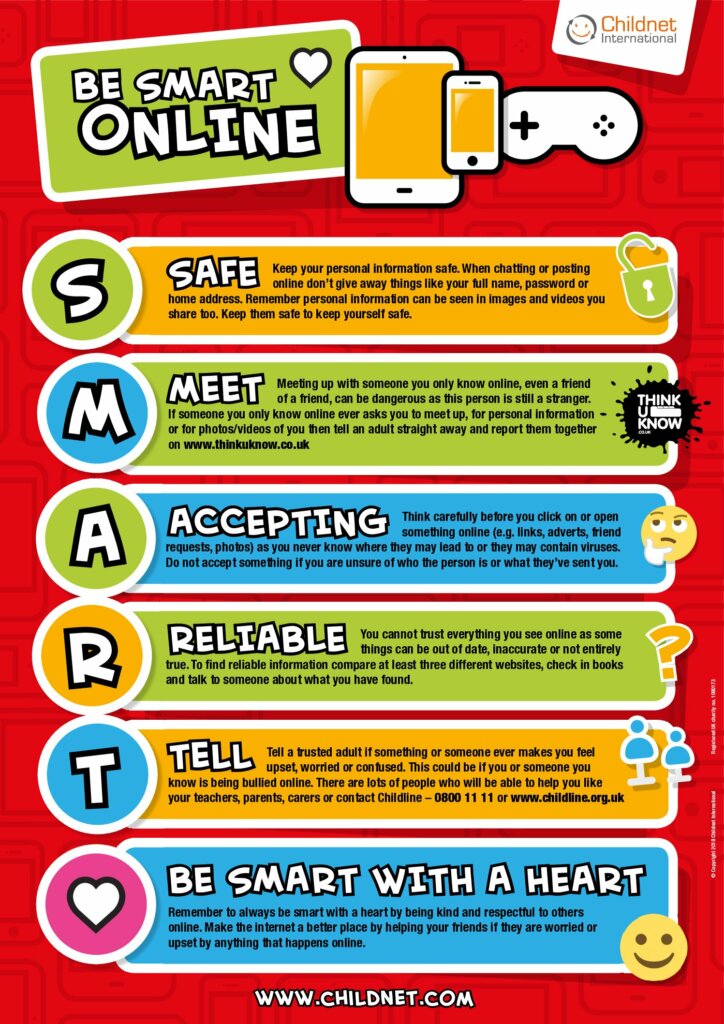For our full policy click here: Online Safety Policy
The internet has changed all of our lives, particularly our children’s. At Mersham Primary School, we strongly encourage sensible use of digital and online technologies. They open up huge possibilities for learning for all of our children. Children can use the internet to research new information, as well as connecting to children they know online or via mobile phone. For parents and carers, this opens up a whole new world of things to be aware of, in particular the need to ensure your child’s safe and responsible use of technology. On the links below, you will find lots of useful information about online safety.
If you have any queries or concerns please speak to Mrs Chalkley or to Mrs Benjamin.
The children are taught about online safety, including the use of devices, throughout the curriculum as well as in discreet sessions. Parent are invited to attend Online Safety Assemblies each year that are presented by each class to show you what they have understood about Online Safety.

At school, we ask all children, staff and volunteers to complete Acceptable Use Agreements. These are documents that outline how we expect members of our school community to behave online and cover things such as:
We also highlight the need to be SMART!
The ‘thinkuknow’ website has lots of information about the possible risks your child faces online. Clicking on the hyperlink to their site below will take you to some practical, primary-school appropriate information about things such as:
As a parent or carer you have a challenging job: you need to know what your children are doing online and also to help them to do it in a safe way. With technology changing on a day-to-day basis, the best way to stay informed is to get involved! Conversation starters might include watching some of the videos on the ‘thinkuknow’ website together and talking about them afterwards, or asking your child to teach you how to do something online. You can use these discussions as a basis for reaching family agreements about how the internet and mobile phones should be used at home.
The most important thing to do is to talk to your child about their online behaviour; what sites they visit, how they behave and what they need to do if something happens online or via mobile phone that makes them feel unhappy, uncomfortable or afraid. The Centre for Exploitation and Online Protection (CEOP) recommend that access to the internet should be via a computer or device kept in a family room, not in the child’s bedroom or away from where an adult would be able to see what they are doing and who they are communicating with.
If you are speaking with your child about online safety and they say something that concerns you, don’t panic – try to keep an open mind. Your key role is listening, calming and providing reassurance that the situation can get better when action is taken. Provide a quiet, calm place where they can talk about what is happening. Listen and reassure them that coming to you was the right thing to do. It may not be easy for a child to talk about their concerns so it is important to try to find out how they are feeling, what has happened, when and where. However, at this stage it is not so much about establishing a set of facts as listening, encouraging and talking – it could be that through your discussion your concerns will be allayed as you understand more their experiences and feelings.
We also recommend:
| Cookie | Duration | Description |
|---|---|---|
| cookielawinfo-checkbox-analytics | 11 months | This cookie is set by GDPR Cookie Consent plugin. The cookie is used to store the user consent for the cookies in the category "Analytics". |
| cookielawinfo-checkbox-functional | 11 months | The cookie is set by GDPR cookie consent to record the user consent for the cookies in the category "Functional". |
| cookielawinfo-checkbox-necessary | 11 months | This cookie is set by GDPR Cookie Consent plugin. The cookies is used to store the user consent for the cookies in the category "Necessary". |
| cookielawinfo-checkbox-others | 11 months | This cookie is set by GDPR Cookie Consent plugin. The cookie is used to store the user consent for the cookies in the category "Other. |
| cookielawinfo-checkbox-performance | 11 months | This cookie is set by GDPR Cookie Consent plugin. The cookie is used to store the user consent for the cookies in the category "Performance". |
| viewed_cookie_policy | 11 months | The cookie is set by the GDPR Cookie Consent plugin and is used to store whether or not user has consented to the use of cookies. It does not store any personal data. |